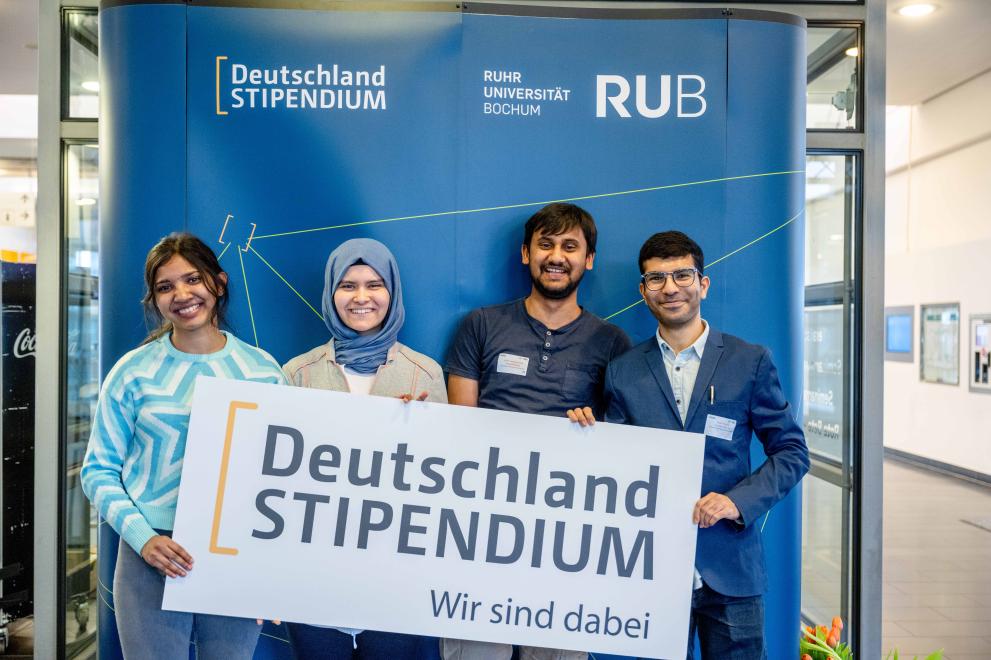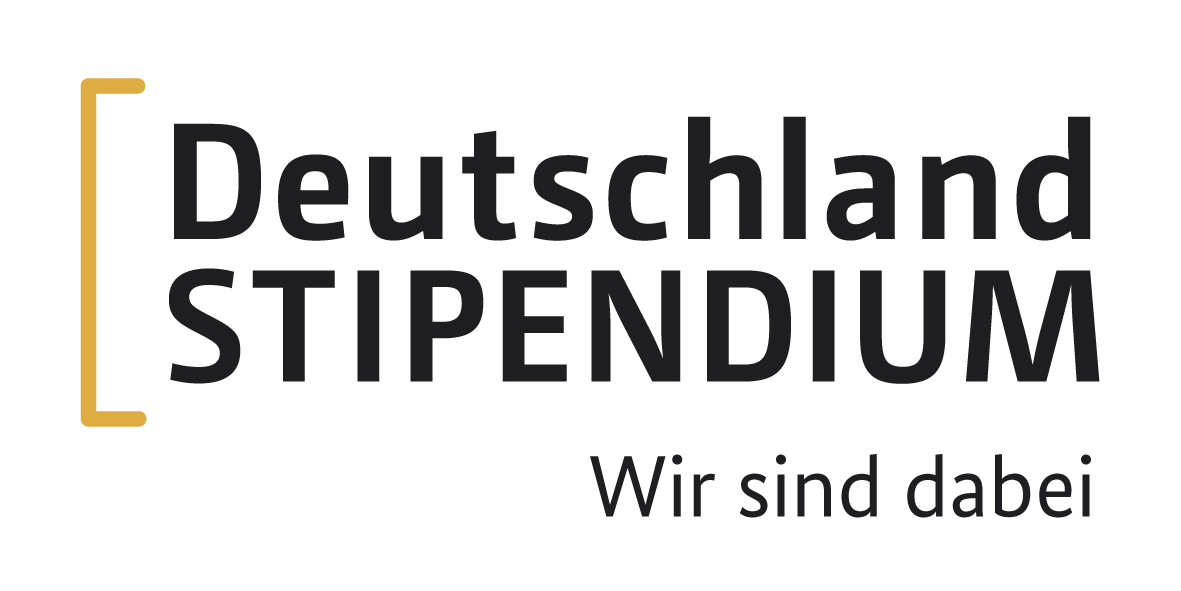Students of all nationalities and all disciplines who are enrolled at RUB. In principle, any degree program is eligible for funding. This includes a second or postgraduate degree program, a Master’s degree program or a part-time/dual degree program. Part-time students and prospective students who are waiting for admission can also apply for the scholarship. PhD students are excluded from the funding.

General information
Deutschlandstipendium: FAQ
You can find more information about the Deutschlandstipendium at www.deutschlandstipendium.de.
Questions on application and awarding
If you cannot log in to complete the application form, please try the following first:
- Use a different browser (experience shows that Google Chrome and Firefox work best).
- Check that you have entered your RUB LoginID correctly.
- Logging in may also work via the Active Directory of IT.Service.
If you are still unable to log in, please contact IT.Services directly, as the Fundraising Office is not able to fix technical problems of individual LoginIDs. Thank you for your understanding.
The scholarship amounts to 300 euros per month. 150 euros are paid by a donor, and the other 150 euros are paid by the German government. The Deutschlandstipendium is paid directly to the scholarship holders by the universities. The scholarship is awarded irrespective of income and can also be received in addition to BAföG. The scholarship usually lasts at least two semesters.
No. Scholarship holders won’t have to repay the money they’ve been awarded.
Sponsored students should be free to concentrate on their education for as long as possible. The scholarship usually lasts at least two semesters. Follow-up scholarship is possible, but it will not be paid for longer than the standard period of study. To receive a follow-up scholarship, another application must be submitted during the application period.
Yes, you can apply for follow-up scholarship after one year. Whether you will receive further funding depends primarily on the quality of your reapplication.
No. Each university decides individually whether and to whom it offers the scholarship.
The legal text on the “Gesetz zur Schaffung eines nationalen Stipendienprogramms” (law on the creation of a national scholarship program) is available here (German version).
The Stipendprogramm-Gesetz (StipG, i.e. Scholarship Programme Act) and the Stipendienprogramm-Verordnung (StipV, i.e. Scholarship Programme Ordinance) specify the funding criteria, which the universities can then implement. The Deutschlandstipendium is intended to support talented and productive students. School and academic performance are important criteria for assessing the ability and talent of applicants. However, the eligibility criteria also include awards and prizes, previous employment and internships, extracurricular commitment and overcoming biographical challenges, such as those caused by an applicant's personal and family background. The application and selection process should take into account the applicant’s entire personality.
The selection criteria for faculty-specific and general scholarships are available here
The scholarship holders are selected by university committees in accordance with established criteria.
No, you can only apply for a Deutschlandstipendium in your first degree or second degree/postgraduate degree program. Scholarships for PhD students are offered by e.g. the Research School. You can find more scholarships on the page “Offers for Doctoral Researchers” (in English) and “Zentrale Studienberatung” (German only).
Yes, if you are enrolled as a regular student.
Yes – please apply via the online application form for school leavers (Abiturient:innen). Please note the application deadlines as stated on the page “Timetable for the application and selection procedure”.
You can only apply if you will be studying at RUB at the start of the funding period. If you are not enrolled at RUB at the moment, but want to enrol at RUB for the winter semester, please contact us during the application phase regarding your application for a Deutschlandstipendium by email: deutschlandstipendium@rub.de.
We will send you a provisional matriculation number by mid-May, which you can use for your online application.
Requests that reach us at a later date will not be considered, nor will applications that do not contain the provisional matriculation number. Transfer students are those who have already been enrolled at a higher education institution or have obtained an academic degree.
Yes. However, preference will be given to international students who are already enrolled at Ruhr-Universität Bochum.
Refugee students or persons seeking protection can also receive a scholarship if they are enrolled at RUB.
Social, family or personal challenges, which will be taken into account in the selection process include refugee status or experience of political persecution. These are considered in the selection process.
Applicants pursuing a second degree/ postgraduate degree are eligible for a Deutschlandstipendium.
Yes, you can also apply for a Deutschlandstipendium. But please inform us immediately when you have completed your Bachelor’s degree and are transferring to the Master’s degree program.
The requirement for continued funding through the Deutschlandstipendium during the transition from the Bachelor’s to the Master’s degree program is a seamless transition (without so-called waiting semesters or exmatriculation). In addition, we require a current Transcript of Records and – if already available – the Bachelor’s degree certificate as well as the current certificate of study (Studienbescheinigung) as proof that you are in the 1st Master’s semester.
In the case of successful completion of studies, the scholarship ends with the announcement of the overall result. However, it ends at the latest at the end of the second month after the last examination has been taken. Otherwise, the scholarship ends at the end of the month in which the scholarship holder discontinues his or her studies, changes the subject area or is exmatriculated.
In the event of a change of university to the same subject area, a transition semester is granted, i.e. the scholarship continues to be paid for one semester. This gives the student the opportunity to apply for a Deutschlandstipendium or other funding at the new university. This applies both to a transfer to a university in Germany and to a university abroad.
To apply, you must enclose your current Transcript of Records. You can print out the transcript yourself via eCampus ("Übersicht über Leistungsnachweise").
Alternatively, please contact the responsible examination office for your course of study, which can create a Transcript of Records for you manually.
The Deutschlandstipendium uses both social commitment and academic achievement as selection criteria. For this reason, you will be asked for a current grade point average (GPA) in your application. Please calculate your GPA as it is usually the case in your degree program. If you have any questions in this regard, please contact your faculty or the relevant examination office; the Fundraising Office cannot make any general statements in this regard. Thank you for your understanding.
Internship, study abroad, leave of absence and sabbatical
Yes, if you meet the eligibility criteria according to § 2, section 1, sentence 2 of the Scholarship Programme Act (StipG), you can apply for a Deutschlandstipendium. The award or receipt of the Deutschlandstipendium is not dependent on the student's place of residence. This includes both distance learning students and regular students with a permanent place of residence abroad.
During a leave of absence, for example for personal or family reasons (e.g. pregnancy, child care or care for a family member), the scholarship will not be paid. Once you resume your studies, the scholarship period will be extended by the duration of the leave of absence.
The scholarship will not be paid if you accept an internship that is not stipulated in the study regulations or if you spend time abroad studying a subject that is not related to your degree course. In all such cases, you must notify us immediately of your leave of absence. The scholarship will then be discontinued. RUB reserves the right to reclaim any scholarship money paid in excess.
A distinction is made between compulsory internships at home and abroad and other internships. Compulsory internships at home or abroad are integrated into the degree program and do not prevent the scholarship from being paid out. If the scholarship holder takes a leave of absence for other internships that are not stipulated in the respective study regulations, the scholarship will be discontinued for the respective semester and will no longer be paid. In this case, students must notify RUB of the leave of absence immediately. RUB reserves the right to reclaim any money paid in excess.
If the voluntary internship takes place during the semester break or if the internship is carried out on only some days of the week, the scholarship can still be paid. The scholarship will also still be paid if the scholarship holder completes the internship with the current sponsor. If the internship is longer than 8 weeks and full-time, RUB reserves the right to discontinue the scholarship and to reclaim any money paid in excess.
The scholarship will still be paid even if you spend time abroad studying a subject relevant for your degree during the funding period. This applies irrespective of any leave of absence at the higher education institution awarding the scholarship. If you study abroad through the ERASMUS+ program, the Deutschlandstipendium will still be paid even if you simultaneously receive a mobility grant from the German Academic Exchange Service (DAAD). Nevertheless, we ask that you not spend time abroad – if possible – during the funding period in order to ensure ongoing exchange and contact with your scholarship donor and other scholarship holders.
Yes, for example for the duration of a DAAD-funded study abroad program or during other funding that cannot be received at the same time as the Deutschlandstipendium. This does not extend the approval period for the Deutschlandstipendium.
Double sponsorship and compatibility with other benefits
As a general rule, anyone who already receives talent and performance-based material support from another institution (e.g. Begabtenförderungswerk) that averages 30 euros or more per month is not eligible for a Deutschlandstipendium.
A detailed overview of the admissibility of other scholarships (e.g. DAAD, PROMOS etc.) at the same time as the Deutschlandstipendium is available here.
If you receive a full DAAD scholarship, you cannot receive the Deutschlandstipendium at the same time, as both scholarships are dependent on talent and performance. However, you can take a leave of absence from the Deutschlandstipendium while you are receiving a DAAD full scholarship. However, if you receive a partial DAAD scholarship, you can receive the Deutschlandstipendium at the same time.
No. The Bafög funds and the scholarship are two complementary programs. This applies to regular Bafög as well as Auslands-Bafög. In principle, students can take advantage of both funding options at the same time without deductions. A deduction is only made insofar as a total amount corresponding to a monthly average of 300 euros is exceeded through the simultaneous receipt of other scholarships. The usual principles of asset imputation apply to saved scholarship funds, i.e. the imputation-free limit of 8,200 euros is not increased when a scholarship is received.
No. As a rule, the scholarship is not offset against other social benefits, such as unemployment benefits “Arbeitslosengeld II”. An exception is the receipt of housing benefit.
Yes. However, recipients of housing benefits must note that, like other scholarships, half of the scholarship is taken into account for the calculation of the annual income. For further questions on scholarships and housing benefits, please contact your local housing benefits office (“Wohngeldstelle”). The Deutschlandstipendium Office cannot make any general statements in this regard. Thank you for your understanding.
The scholarship does not affect any child benefits received by the scholarship holder’s parents.
The scholarship does not affect the statutory health insurance as long as the scholarship holder has a mandatory health insurance with a statutory health insurance provider (usually until the completion of the 14th semester or the 30th birthday). This changes if the scholarship holder is (subsequently) insured as a voluntary member. For voluntary members, the legislator has prescribed a minimum contribution. If the insured person’s income that is liable for contributions (which includes scholarships) exceeds an assessment basis specified by the legislator, the respective income is liable for taxation.
Yes, the scholarship is taken into account in the child maintenance to reduce the need for support. Students who have reached their legal age are required to support themselves from their own resources before asserting claims against their parents. The scholarship counts as part of the scholarship holder’s own income.
A (half-) orphan’s benefit is a form of income and not an academic scholarship. The Deutschlandstipendium is granted irrespective of income and thus cannot and must not affect an orphan’s benefit.
The Stipendienprogramm-Gesetz (StipG, Scholarship Programme Act) was drafted in such a way that the scholarship is generally not subject to taxation or social security deductions.
Working as a student trainee does not preclude the receipt of the Deutschlandstipendium, nor does the pursuit of any other paid employment alongside studies ("Werkstudent", mini-job etc). However, in accordance with § 5 Abs. 2 StipG, the scholarship may neither be made dependent on a consideration for the private funding provider nor on an employee activity or a declaration of intent regarding a later employee activity.
Only if they constitute talent and performance-based material support. For example, programs to teach soft skills or interdisciplinary knowledge, as well as mentoring programs do not preclude funding.
Material support is support in the form of cash or non-cash benefits. Benefits that are of monetary value, but which have a primarily educational character and which scholarship holders would otherwise not be able to afford, are considered non-material support, for example newspaper subscriptions. In contrast, financial aid for internet connection would constitute material support.


